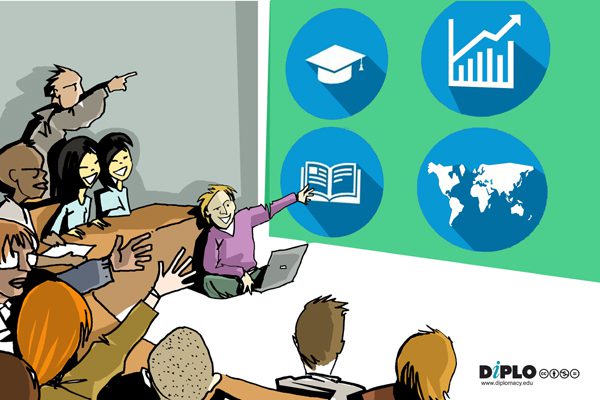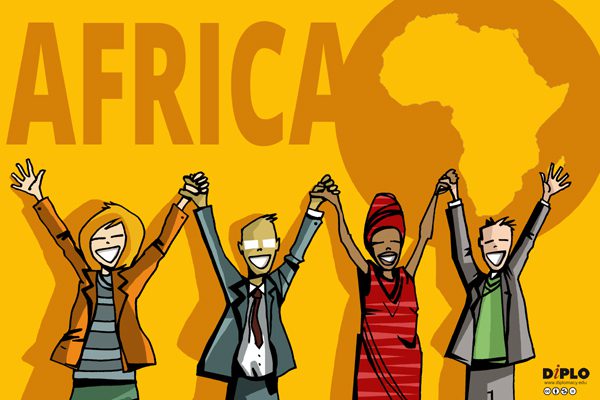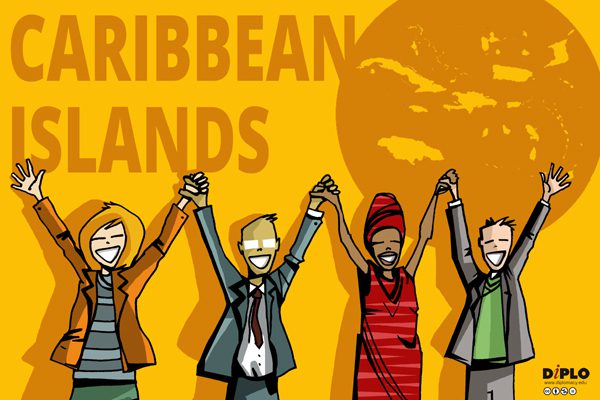Types of diplomacy
There are 136 uses of the term diplomacy in three contexts:
- Geopolitics and geo-economics (dollar diplomacy, gunboat diplomacy)
-
Topics areas addressed by diplomacy: digital diplomacy, development diplomacy, economic diplomacy, cyber diplomacy, AI diplomacy, energy diplomacy, health diplomacy, science diplomacy, sport diplomacy, climate diplomacy, education diplomacy, etc.
-
Methods and tools for conducting diplomacy: bilateral and multilateral diplomacy, public diplomacy , and metaverse diplomacy.
| Types of Diplomacy | Diplomacy & Geopolitics | Diplomatic Topics | Diplomatic Methods & Tools | |
|---|---|---|---|---|
| AI Diplomacy | Yes | Yes | Yes | |
| Aid Diplomacy | ||||
| Amarna Diplomacy | Yes | Yes | Yes | |
| Ancient Diplomacy | ||||
| Animal Diplomacy | Yes | |||
| Art Diplomacy | Yes | Yes | ||
| Big Stick Diplomacy | Yes | |||
| Bilateral Diplomacy | Yes | |||
| Biodiversity Diplomacy | Yes | |||
| Blockchain Diplomacy | Yes | |||
| Byzantine Diplomacy | Yes | Yes | Yes | |
| Cable Diplomacy | Yes | Yes | ||
| Carbon Diplomacy | Yes | |||
| Carpet Diplomacy | Yes | |||
| Caviar Diplomacy | Yes | |||
| Chip Diplomacy | Yes | Yes | Yes | |
| Citizen Diplomacy | Yes | |||
| City Diplomacy | Yes | |||
| Civil Diplomacy | Yes | |||
| Climate Diplomacy | Yes | Yes | Yes | |
| Coercive Diplomacy | Yes | Yes | ||
| Coffee Diplomacy | Yes | |||
| Cold War Diplomacy | Yes | Yes | ||
| Conference Diplomacy | Yes | |||
| Consular Diplomacy | Yes | |||
| Covid Diplomacy | Yes | |||
| Crisis Diplomacy | Yes | |||
| Crypto Diplomacy | Yes | Yes | ||
| Cultural Diplomacy | Yes | Yes | ||
| Cyber Diplomacy | Yes | |||
| Data Diplomacy | Yes | Yes | ||
| Debt Diplomacy | Yes | Yes | ||
| Development Diplomacy | Yes | Yes | ||
| Diaspora Diplomacy | Yes | Yes | ||
| Digital Diplomacy | Yes | Yes | Yes | |
| Disaster Diplomacy | Yes | Yes | ||
| Dog Diplomacy | Yes | |||
| Dollar Diplomacy | Yes | |||
| Dubovnik Diplomacy | Yes | |||
| Earthquake Diplomacy | Yes | |||
| Education Diplomacy | Yes | Yes | ||
| Environmental Diplomacy | Yes | Yes | ||
| Exibition Diplomacy | Yes | |||
| Expo Diplomacy | Yes | |||
| Facebook Diplomacy | Yes | |||
| Fado Diplomacy | Yes | |||
| Food Diplomacy | Yes | Yes | ||
| Funeral Diplomacy | Yes | |||
| Fusion Diplomacy | Yes | |||
| Gastronomic Diplomacy | Yes | |||
| Gender Diplomacy | Yes | |||
| Gift Diplomacy | ||||
| Grain Diplomacy | Yes | |||
| Grasroot Diplomacy | Yes | |||
| Gulf Diplomacy | Yes | |||
| Gumboot Diplomacy | Yes | |||
| Gunboat Diplomacy | Yes | |||
| Hard Diplomacy | Yes | |||
| Health Diplomacy | Yes | |||
| Hostage Diplomacy | Yes | |||
| Humanitarian Diplomacy | Yes | |||
| Hybrid Diplomacy | Yes | |||
| ICT Diplomacy | Yes | |||
| Instagram Diplomacy | Yes | |||
| Inter-faith Diplomacy | Yes | |||
| Internet Diplomacy | Yes | |||
| Investment Diplomacy | Yes | |||
| Language Diplomacy | Yes | Yes | ||
| Lunar Diplomacy | Yes | |||
| Maritime Diplomacy | Yes | |||
| Mediaval Diplomacy | Yes | |||
| Metaverse Diplomacy | Yes | |||
| Middle East Diplomacy | Yes | |||
| Military Diplomacy | Yes | Yes | ||
| Missionary Diplomacy | Yes | |||
| Mob Diplomacy | Yes | |||
| Modern Diplomacy | Yes | |||
| Moon Diplomacy | Yes | Yes | ||
| Multilateral Diplomacy | Yes | |||
| Multistakeholder Diplomacy | Yes | |||
| Music Diplomacy | Yes | |||
| Nuclear Diplomacy | Yes | |||
| Ocean Diplomacy | Yes | |||
| Oil Diplomacy | Yes | |||
| Olympics Diplomacy | Yes | |||
| Online Diplomacy | Yes | Yes | ||
| Open Diplomacy | Yes | |||
| Ozone Diplomacy | Yes | |||
| Panda Diplomacy | Yes | |||
| Parliamentary Diplomacy | Yes | |||
| Particle Diplomacy | Yes | |||
| Peace Diplomacy | Yes | Yes | Yes | |
| People-to-People Diplomacy | Yes | |||
| Ping-Pong Diplomacy | Yes | |||
| Pizza Diplomacy | Yes | |||
| Preventive Diplomacy | Yes | Yes | ||
| Proxy Diplomacy | Yes | |||
| Quantum Diplomacy | Yes | Yes | ||
| Region Diplomacy | Yes | |||
| Religious Diplomacy | Yes | |||
| Rennaisance Diplomacy | Yes | |||
| Row material diplomacy | Yes | |||
| Sand Diplomacy | Yes | |||
| Satellite Diplomacy | Yes | |||
| Sauna Diplomacy | Yes | |||
| Science Diplomacy | Yes | Yes | Yes | |
| Secret Diplomacy | Yes | |||
| Semiconductor Diplomacy | Yes | |||
| Shuttle Diplomacy | Yes | |||
| Silent Diplomacy | Yes | |||
| Soft Power Diplomacy | Yes | |||
| Sound Diplomacy | Yes | |||
| Space Diplomacy | Yes | |||
| Sport Diplomacy | Yes | Yes | ||
| Sub-state Diplomacy | Yes | |||
| Summit Diplomacy | Yes | |||
| Tea Diplomacy | Yes | Yes | ||
| Tech Diplomacy | Yes | Yes | Yes | |
| Telegraph Diplomacy | Yes | Yes | Yes | |
| Telephone Diplomacy | Yes | Yes | Yes | |
| Toothless Diplomacy | Yes | |||
| Track-Two Diplomacy | Yes | |||
| Trade Diplomacy | Yes | |||
| Triangular Diplomacy | Yes | |||
| Twitter Diplomacy | Yes | |||
| Vaccine Diplomacy | Yes | Yes | ||
| Venice Diplomacy | Yes | Yes | ||
| Virtual Diplomacy | Yes | |||
| War Diplomacy | Yes | Yes | Yes | |
| Water Diplomacy | Yes | |||
| Web Diplomacy | Yes | |||
| Wolf Warrior Diplomacy | Yes | |||
| Wrestling Diplomacy | Yes | |||
| Yoga Diplomacy | Yes | |||
| Youth Diplomacy | Yes |

Books on various types of diplomacy – Library of Jovan Kurbalija
Bilateral diplomacy is a type of diplomacy that involves two countries or entities engaging in direct negotiations and agreements. It is a form of international relations in which two countries or entities work together to resolve issues and create mutually beneficial outcomes. Bilateral diplomacy can involve a wide range of topics, from trade and security to cultural and environmental issues.
Multilateral diplomacy is a form of international relations in which multiple countries work together to achieve a common goal. It involves using negotiations, dialogue, and other diplomatic tools to resolve disputes and promote cooperation between nations. Multilateral diplomacy is often used to address global issues such as climate change, poverty, and human rights.
Metaverse diplomacy is the practice of engaging in diplomatic activities and negotiations in virtual worlds, such as video games, virtual reality, and other online platforms. It involves using digital tools to facilitate communication between players, governments, and other stakeholders. It is a form of digital diplomacy that seeks to bridge the gap between the physical and virtual worlds.
Public diplomacy is a type of diplomacy that focuses on engaging with the foreign public to build relationships and influence public opinion. It is a form of soft power which uses cultural, economic, and educational exchanges to build relationships and foster understanding between countries. Public diplomacy can also involve using media and other communication forms to reach foreign audiences.
Development diplomacy is a type of diplomacy that focuses on the use of diplomatic tools to promote economic and social development. It involves using diplomatic channels to facilitate international cooperation and collaboration on development-related issues, such as poverty reduction, health, education, and environmental protection. Development diplomacy also involves using diplomatic tools to support the implementation of development projects and initiatives.
Economic diplomacy is the use of economic instruments to achieve foreign policy objectives. It involves using economic tools such as trade, investment, finance, and development assistance to advance a country’s interests in the international arena. Economic diplomacy is used to promote economic growth, create jobs, and foster international cooperation. It can also be used to strengthen diplomatic ties between countries and to resolve disputes.
Cyber diplomacy is the use of digital technology and communication to facilitate international relations and diplomacy. It involves the use of digital tools such as social media, websites, and other online platforms to engage in diplomatic dialogue, build relationships, and promote international cooperation. Cyber diplomacy can also be used to address global issues such as cyber security, data privacy, and digital infrastructure.
Energy diplomacy is the use of diplomatic relations to promote and protect countries’ interests in the energy sector. It involves the coordination of energy policies between countries, as well as the negotiation of international agreements on energy–related issues. Energy diplomacy also includes promoting energy security, reducing energy poverty, and promoting sustainable energy development.
Health diplomacy uses diplomatic tools to promote and protect global health. It involves using diplomatic strategies to address global health challenges, such as pandemics, access to healthcare, and health equity. Health diplomacy also involves international cooperation to improve global health outcomes.
Science diplomacy is using science and technology to build bridges between countries and promote international cooperation. It involves using scientific research, technology, and expertise to address global challenges like climate change, pandemics, and food security. Science diplomacy also fosters collaboration between scientists from different countries and promotes sharing knowledge and resources.
Sports diplomacy is using sports to promote international relations, peace, and understanding. It involves using sports to build bridges between countries, cultures, and people and foster dialogue and cooperation. Sports diplomacy can promote social and economic development, human rights, gender equality, and environmental protection. It can also be used to strengthen diplomatic ties between countries and to create a platform for dialogue on global issues.
Climate diplomacy is the use of diplomatic tools to address climate change. It involves engaging with other countries, international organizations, and non–state actors to develop and implement policies and actions that reduce greenhouse gas emissions and promote climate resilience. Climate diplomacy also includes efforts to build international consensus on climate change, such as through the United Nations Framework Convention on Climate Change (UNFCCC).
Education diplomacy is the use of education as a tool to promote international relations and foster mutual understanding between countries. It involves the exchange of students, faculty, and ideas between countries, as well as the development of educational initiatives that promote global understanding and collaboration. Education diplomacy can also involve the use of educational resources to support international development goals.
Click to show page navigation!














